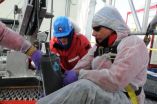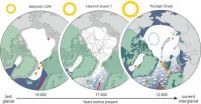(Press-News.org) ATLANTA—Strongly influenced by their self-interest, humans do not protest being overcompensated, even when there are no consequences, researchers in Georgia State University's Brains and Behavior Program have found.
This could imply that humans are less concerned than previously believed about the inequity of others, researchers said. Their findings are published in the journal Brain Connectivity. These findings suggest humans' sense of unfairness is affected by their self-interest, indicating the interest humans show in others' outcomes is a recently evolved propensity.
It has long been known that humans show sensitivity when they are at a disadvantage by refusing or protesting outcomes more often when they are offered less money than a social partner. But the research team of physics graduate students Bidhan Lamichhane and Bhim Adhikari and Brains and Behavior faculty Dr. Sarah Brosnan, associate professor of psychology, and Dr. Mukesh Dhamala, associate professor of physics and astronomy, reports that, contrary to expectations, humans do not show any sensitivity when they are overcompensated. They conclude that humans are more interested in their own outcomes than those of others.
"A true sense of fairness means that I get upset if I get paid more than you because I don't think that's fair," Brosnan said. "We thought that people would protest quite a bit in the fixed decision game because it's a cost-free way to say, 'This isn't fair.' But that's not what we saw at all. People protested higher offers at roughly the same rate that they refused offers where they got more, indicating that this lack of refusal in advantaged situations may not be because of the cost of refusing. It may just be because people don't care as much as we thought they did if they're getting more than someone else."
The researchers also used functional magnetic resonance imaging (fMRI) to study the underlying brain mechanisms from 18 participants, who played three two-person economic exchange games that involved inequity in their favor and not in their favor. Overcompensated offers triggered a different brain circuit than undercompensated offers and indicate that people may be responding to overcompensation as if it were a reward. This could explain the lack of refusals in this unfair situation, researchers said.
Each game involved three offers for how $100 would be split: fair (amount between $40 to $60), unfair-low (disadvantageous to the subject, amount between $0 to $20) and unfair-overcompensated (advantageous to the subject, amount between $80 to $100). Participants played 30 rounds of each game and earned about two percent of the total amount from the games.
In the first two games, the subject received an offer for how much money they would receive and were then asked whether they wanted to reject or accept it. In the Ultimatum Game, if the responder rejected the offer, neither player received any money, leading to a fair outcome. In the Impunity Game, if the subject rejected the offer, only he or she lost the payoff, meaning the outcome was even more unfair than the offer. The subject got nothing, but the partner still got their proposed amount. In the Fixed Decision Game, the subject could choose to protest or not protest the offers, but this didn't change the outcome for either player. This allowed subjects to protest offers without an associated cost.
The blood-oxygen level dependent signals of the brain were recorded by an MRI scanner as participants played the games. The results of brain response provided new insights into the functional role of the dorsolateral prefrontal cortex and related networks of brain regions for advantageous inequity and protest.
A network of brain regions consisting of the left caudate, right cingulate and right thalamus had a higher level of activity for overcompensated offers than for fair offers. For protest, a different network, consisting of the right dorsolateral prefrontal cortex, left ventrolateral prefrontal cortex and left substantia nigra, came into play. The researchers also mapped out how the brain activity flow occurred within these networks during decision-making.
INFORMATION:
The study was funded by a grant from the Brains and Behavior Program at Georgia State. The study, "The Neural Basis of Perceived Unfairness in Economic Exchanges," is available online at
http://online.liebertpub.com/doi/abs/10.1089/brain.2014.0243
Influenced by self-interest, humans less concerned about inequity to others
2014-08-21
ELSE PRESS RELEASES FROM THIS DATE:
Women's health and Fifty Shades: Increased risks for young adult readers?
2014-08-21
New Rochelle, NY, August 21, 2014—Popular fiction that normalizes and glamorizes violence against women, such as the blockbuster Fifty Shades series, may be associated with a greater risk of potentially harmful health behaviors and risks. The results of a provocative new study are presented in the article "Fiction or Not? Fifty Shades Is Associated with Health Risks in Adolescent and Young Adult Females," published in Journal of Women's Health, a peer-reviewed publication from Mary Ann Liebert, Inc., publishers. The article is available free on the Journal of Women's Health ...
AAAS: Sri Lanka images show no significant increase in public facilities, despite promises
2014-08-21
Thousands of Sri Lankans remain refugees five years after a long civil war, and satellite-image analysis seems to reveal many new housing-like structures and development in a military zone in the northern part of the country. However, the analysis also shows no significant increase in civic facilities despite government claims that it has seized the land for public use.
The analysis, completed by the nonprofit, nonpartisan American Association for the Advancement of Science (AAAS), suggests a sharp increase in the number of residential housing-type structures within the ...
Research offers insight into cellular biology of colorectal cancer
2014-08-21
LAWRENCE — A study recently published in the journal Carcinogenesis by researchers at the University of Kansas shows a new role for the protein adenomatous polyposis coli (APC) in suppressing colorectal cancer — the second-leading cause of cancer-related deaths in the U.S.
Lead author Kristi Neufeld, associate professor in the Department of Molecular Biosciences and co-leader of the Cancer Biology program at the KU Cancer Center, has spent the better part of her career trying to understand the various activities of APC, a protein whose functional loss is thought to initiate ...
Delivery by drone
2014-08-21
CAMBRIDGE, MA -- In the near future, the package that you ordered online may be deposited at your doorstep by a drone: Last December, online retailer Amazon announced plans to explore drone-based delivery, suggesting that fleets of flying robots might serve as autonomous messengers that shuttle packages to customers within 30 minutes of an order.
To ensure safe, timely, and accurate delivery, drones would need to deal with a degree of uncertainty in responding to factors such as high winds, sensor measurement errors, or drops in fuel. But such "what-if" planning typically ...
Conclusive evidence on role of circulating mesenchymal stem cells in organ injury
2014-08-21
New Rochelle, NY, August 21, 2014--Mesenchymal stem cells (MSCs) are present in virtually every type of human tissue and may help in organ regeneration after injury. But the theory that MSCs are released from the bone marrow into the blood stream following organ damage, and migrate to the site of injury, has long been debated. M.J. Hoogduijn and colleagues provide conclusive evidence to resolve the controversy over the mobilization and migration of MSCs in humans in a new study published in Stem Cells and Development, a peer-reviewed journal from Mary Ann Liebert, Inc., ...
The Lancet: Experimental Ebola drugs must be fairly distributed and tested ethically in clinical trials
2014-08-21
Researchers and health authorities need to ensure that experimental drugs to treat Ebola are distributed fairly, and in the context of randomized controlled trials, according to a new Viewpoint, published in The Lancet today [Thursday 21 August, 2014].
Leading bioethicists Professor Ezekiel Emanuel, of the University of Pennsylvania, Philadelphia, USA, and Dr Annette Rid, of King's College London, UK, outline critical ethical principles which need to be adhered to if experimental drugs are to be deployed in the Ebola outbreak, stating that the patients selected to receive ...
Polio: Mutated virus breaches vaccine protection
2014-08-21
Thanks to effective vaccination, polio is considered nearly eradicated. Each year only a few hundred people are stricken worldwide. However, scientists of the University of Bonn, together with colleagues from Gabon, are reporting alarming findings: a mutated virus that was able to resist the vaccine protection to a considerable extent was found in victims of an outbreak in the Congo in 2010. The pathogen could also potentially have infected many people in Germany. The results appear now in the magazine PNAS.
The polio epidemic in the Congo in 2010 was especially serious. ...
Mindfulness-based depression therapy reduces health care visits
2014-08-21
August 21, 2014 (Toronto) – A mindfulness-based therapy for depression has the added benefit of reducing health-care visits among patients who often see their family doctors, according to a new study by the Centre for Addiction and Mental Health (CAMH) and the Institute for Clinical Evaluative Sciences (ICES).
The research showed that frequent health service users who received mindfulness-based cognitive therapy showed a significant reduction in non-mental health care visits over a one-year period, compared with those who received other types of group therapy.
The ...
800 meters beneath Antarctic ice sheet, subglacial lake holds viable microbial ecosystems
2014-08-21
BATON ROUGE – In a finding that has implications for life in other extreme environments, both on Earth and planets elsewhere in the solar system, LSU Associate Professor of Biological Sciences Brent Christner and fellow researchers funded by the National Science Foundation, or NSF, this week published a paper confirming that the waters and sediments of a lake that lies 800 meters (2600 feet) beneath the surface of the West Antarctic ice sheet support "viable microbial ecosystems."
Given that more than 400 subglacial lakes and numerous rivers and streams are thought to ...
Arctic sea ice influenced force of the Gulf Stream
2014-08-21
For AWI geologist Juliane Müller the Fram Strait is a key region in the global oceanic circulation. "On the east side of this passage between Greenland and Svalbard warm Atlantic water flows to the north into the Arctic Ocean while on the west side cold Arctic water masses and sea ice push their way out of the Arctic into the North Atlantic. A considerable portion of the Atlantic water cools here on its way to the north and sinks to deeper layers. The circulation of the water caused in this manner drives the global band of oceanic currents like a giant pump and influences, ...





